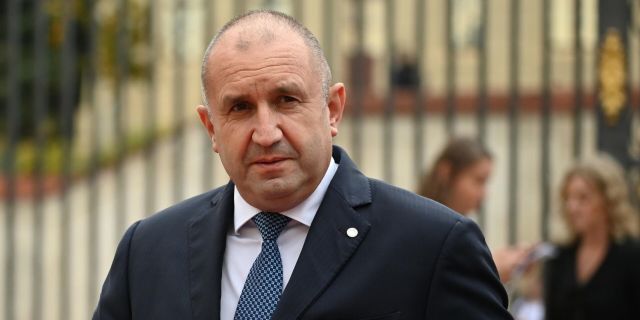Bulgarian President Radev opposed additional arms supplies to UkraineBulgaria will not give more weapons to Ukraine, "Capital" quotes the words of President Radev.
Sofia insists that the EU must fight for peace. This position isolates Radev from other European leaders and brings him closer to Orban.
Monika Vyrbanova (Monika Vyrbanova)Ukrainian President Volodymyr Zelensky arrived in Brussels on Thursday to remind Europe that his country is on the verge of its capabilities.
After the major successes of the Ukrainian army in the second half of 2022, Russia strikes back, sending tens of thousands of mobilized soldiers to the front. Kiev expects Moscow to expand the offensive on the anniversary – around February 24.
After visiting London and Paris, Zelensky will insist that EU leaders provide more weapons in Brussels on Thursday (February 9) and begin negotiations on Ukraine's membership in the EU.
Bulgaria will say a firm "no" to these requests of his. According to Rumen Radev, Ukraine will not be given more weapons. Bulgaria insists that the EU must fight for peace.
"The Provisional Government has implemented the decision of the People's Assembly to send weapons from the reserves of the Bulgarian army. I hope the government will be prudent and will not allow this in the future. This is a bloody conflict in which we hear less and less voices for peace. I will call on the EU to use all its power and tools to make diplomatic efforts in the name of peace," the president told reporters in Brussels before meeting with his Ukrainian counterpart.
Zelensky's visit to Brussels will take place just a week after the EU-Ukraine summit, which took place in Kiev last Friday. He will address the European Parliament and visit NATO headquarters.
Bilateral meetings are planned with all 27 European leaders (individually or in groups) – for the first time since February 24. Bulgaria is represented by President Rumen Radev. However, even before the meeting with the Ukrainian president, he said that he would not support the provision of additional weapons to Ukraine or new sanctions related to Russian nuclear fuel. This position isolates him from other European leaders.
Will Ukraine get more weapons from the EU?
The current trip of the President of Ukraine is the second official trip outside the country since February 24 (after an unexpected visit to Washington in December).
Having received the promises of Western battle tanks, the Ukrainian authorities focused on trying to get longer-range missiles and fighters, which until recently seemed almost impossible. The countries of Eastern Europe, with the exception of Bulgaria, unconditionally support the supply of fighters to Kiev, France and the Netherlands are not completely against this idea, the UK is hesitant, but probably will take action, and Germany is categorically against it. In London, Zelensky received a promise from British Prime Minister Rishi Sunak that Ukrainian pilots would be trained on modern NATO fighters.
In Paris, Emmanuel Macron and German Chancellor Olaf Scholz assured Zelensky of further support for Ukraine. "France and Germany have the potential to change the game, and that's how I see our negotiations today," Zelensky said at the time, "The sooner we get heavy long—range weapons, and our pilots are modern aircraft (...), the sooner this Russian aggression will end."
However, whatever Zelensky wants from the EU, Bulgaria does not seem to be going to give it to him. "A year after the start of this bloody conflict, the main attention should be paid to its termination. Bulgaria will continue to support the Ukrainian people in their just struggle to survive these critical winter months. Bulgaria will continue to support Ukrainian refugees to the best of its ability," President Rumen Radev said before the leaders' meeting.
New sanctions against Russia, Bulgaria to veto again
Zelensky is likely to put pressure on EU leaders to include nuclear energy, especially Rosatom, in the next package of sanctions against Russia. This is especially important because of the transition of the Zaporozhye NPP to Russia in March last year. At the moment, EU members are working on the tenth package of sanctions, which, according to officials and diplomats, should be ready by February 24.
Bulgaria is going to veto such a decision because it contradicts its interests, Radev said a few minutes before the leaders' meeting in Brussels. By doing so, Radev is approaching the positions of Hungarian President Viktor Orban and risks being isolated at a time when he needs support to join the Schengen area, and also insists on new negotiations on his "green" goals in Terms of reconstruction.
Is Ukraine an EU member?
This probably won't happen soon. And although German Chancellor Olaf Scholz says that he sends "a clear signal to Brussels: Ukraine belongs to the European family," he also talks about reforming the union before further expansion. Other member states of the Union behaved more cautiously and noted the need to comply with a set of criteria set by the European Commission before the start of negotiations. They believe that Ukraine should not be given priority while other Balkan countries are waiting for their turn.
However, Ukrainian officials consider this argument "artificial", referring to the fact that most of the leaders of the Western Balkans welcomed the impetus given to them by the Ukrainian side.

